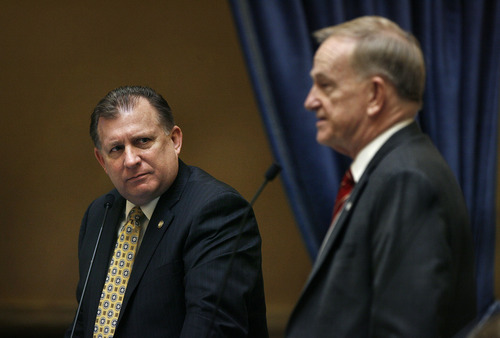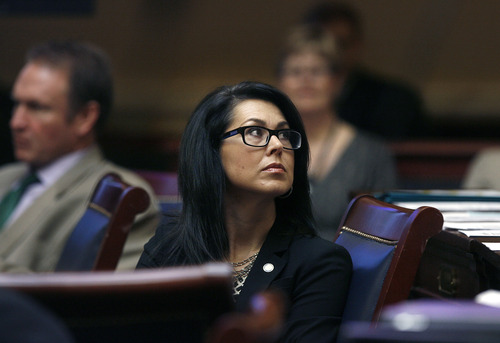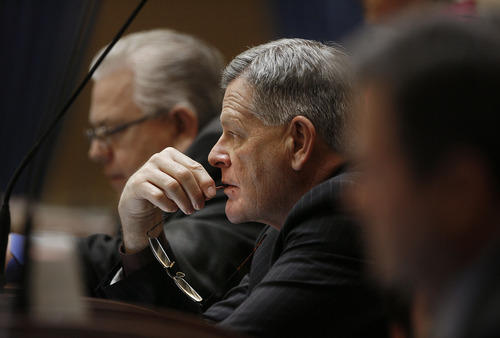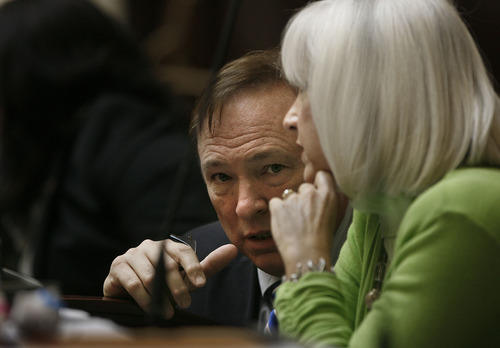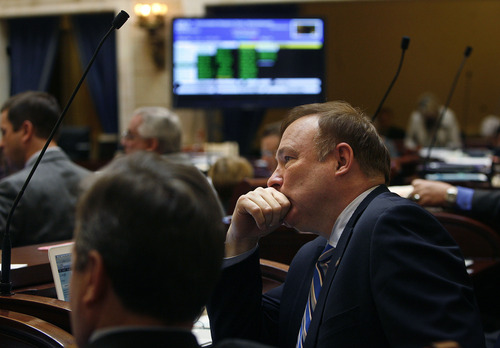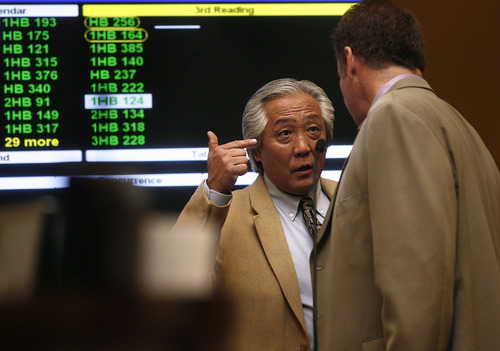This is an archived article that was published on sltrib.com in 2013, and information in the article may be outdated. It is provided only for personal research purposes and may not be reprinted.
The Utah Senate set up a showdown between Gov. Gary Herbert and the Legislature by passing a bill on Wednesday that would allow people to carry a concealed firearm without a permit.
HB76 has given Herbert some consternation and he's seen pressure from a variety of groups to veto the measure — including from the League of Women Voters and a newly formed group called Utah Parents Against Gun Violence. And Friday, the Catholic Diocese of Salt Lake City will send a letter to Herbert urging him to reject the measure.
But its sponsor, Rep. John Mathis, R-Vernal, has repeatedly said the bill is simply a matter of convenience for ranchers in rural areas who might find themselves in violation of the law by accidentally covering a gun while putting on a raincoat.
Since it was unveiled near the beginning of the legislative session, however, it has become a rallying point for gun-rights advocates who view the bill as a rebuke against the national push for tougher gun laws and a further move toward guarantees they believe are harbored in the Second Amendment.
The fevered pitch on gun rights came as President Barack Obama pushed for expanded background checks, limited magazine capacities and bans on semi-automatic rifles after the mass shooting at Connecticut's Sandy Hook Elementary School in December. The massacre killed 20 first-graders — including Utah native Emilie Parker — and six adults.
The vote in the Senate Wednesday was 21-7 — with only two Republicans opposing the measure. It passed the House of Representatives in February 51-18. Both vote totals — if they were to hold — would be sufficient to override a veto by Herbert. An override requires at least 50 votes in the House and 20 in the Senate.
Herbert has not indicated if he will veto the measure, but said Tuesday he's comfortable with the current concealed-weapons permit law.
"I've made my position pretty clear," Herbert said. "'If it ain't broke, don't fix it' comes to mind and in Utah it isn't broken."
Later Wednesday, House Speaker Becky Lockhart, R-Provo, addressed the possibility of a veto. "If he's going to veto a bill, if it's good policy that the people of the state need, we'll override it," she said.
In arguing for the bill, Senate sponsor Allen Christensen, R-North Ogden, said it aligns the state with the Constitution.
"It simply gives honest people the right to do what they cannot do honestly right now — which is cover up their weapons," Christensen said. "The bad guys will always have the advantage of not obeying the laws."
Critics of the measure have argued elimination of the classroom instruction required to obtain a concealed-weapons permit coupled with the background check required by the Utah Department of Public Safety will result in dangerous people carrying firearms.
Since 2010, there have been 2,155 denials for concealed-weapons permits in Utah for a variety reasons that include drug or alcohol violations, sexual abuse against children, domestic violence convictions, rape or burglary.
Sen. Jim Dabakis, D-Salt Lake City, said HB76 is "a bullet too far" and questioned the wisdom of opening up firearms ownership to any adult.
"I think this is going to cost lives, at least in my district, with no training, no background checks," he said. "Background checks are a good thing. They catch people that most of us agree shouldn't have a gun."
Much of the debate on the measure occurred Tuesday when the Senate gave it preliminary approval.
Sen. Evan Vickers, R-Cedar City, was one of the few who spoke in favor of the measure in the face of opposition from Sen. Pat Jones, D-Holladay, and Sen. Lyle Hillyard, R-Logan.
"As I look at this bill, it's an incremental step forward where it protects those people on farms and ranches who are out on the range and I think the intent is well-meaning," Vickers said.
And Sen. Curt Bramble, R-Provo, argued that there is no current live-fire training requirement for concealed-weapons permit holders.
Mathis said Wednesday he hadn't had much time to think about what happened with the Senate vote. "I worked pretty hard on it," he said.
If Herbert signs the bill, Utah would join about a half-dozen other states with constitutional-carry laws on the books, including Vermont, Arizona, Wyoming and Montana.
Twitter: @davemontero


